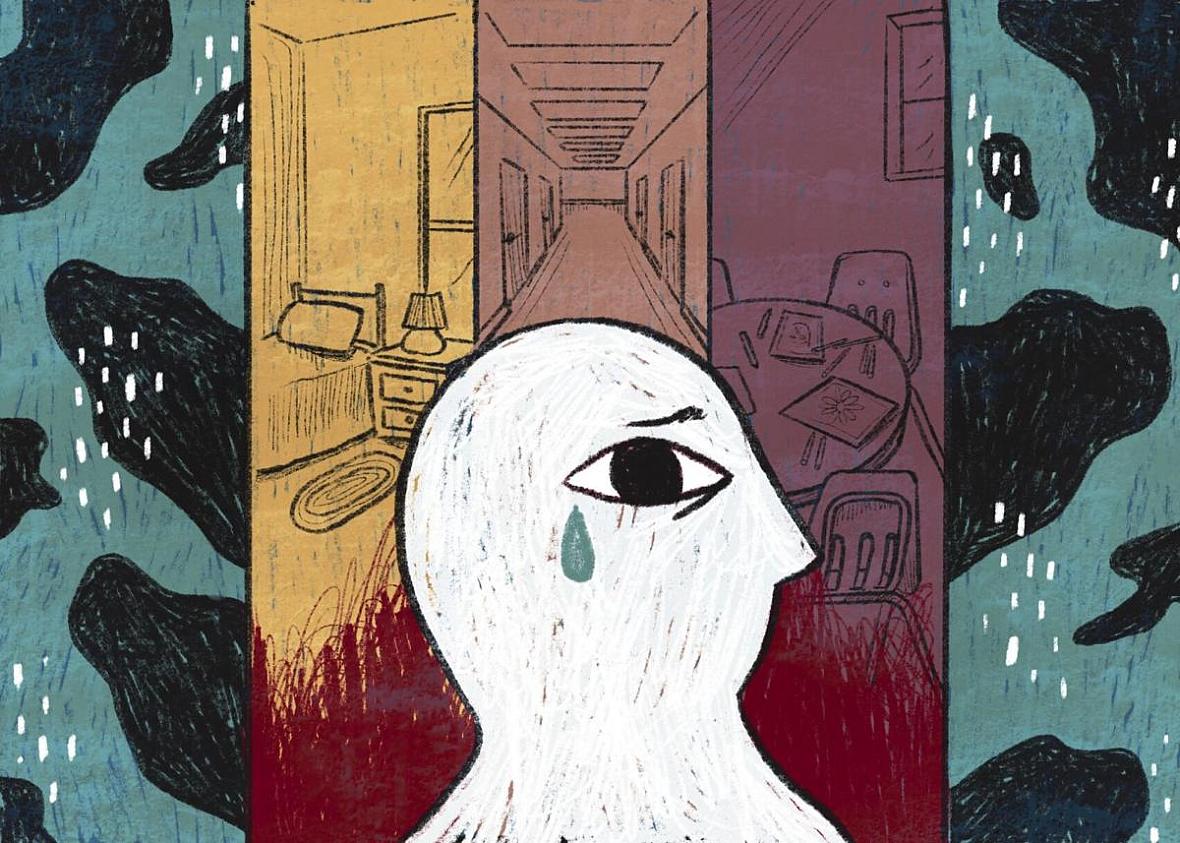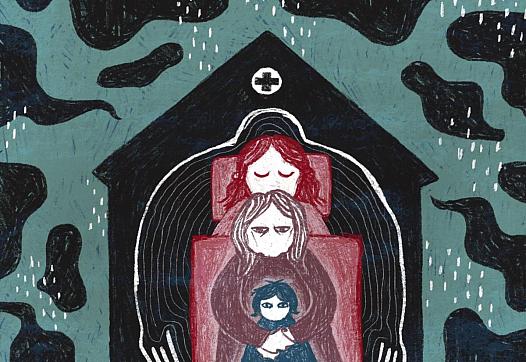Unsafe, Part 2: For Arizona's disabled, abuse can happen anywhere, by anyone
The story was originally published in Arizona Daily Star/KJZZ with support from the USC Annenberg Center for Health Journalism’s 2022 Data Fellowship.

Illustration by Theo Grace Quest
An analysis of more than 10,000 incident reports collected by the state of Arizona in 2019 and 2020 reveal hundreds of claims of sexual and physical abuse of people with intellectual and developmental disabilities and more than 3,500 instances of alleged neglect.
The Arizona Daily Star and KJZZ spent a year examining the data, obtained through a public records request. Although the reports were sometimes heavily redacted or incomplete, they painted a picture of desperation among caregivers, family members and — most importantly — people with intellectual and developmental disabilities, often referred to as IDD.
The main takeaway: Abuse can take place anywhere, and the perpetrator can be anyone.
In Arizona, about 45,000 people with IDD receive services from the state. They are referred to as “members.”
Experts caution that most instances of abuse and neglect are not documented in the first place. The U.S. Inspector General found in a 2021 study that 99% of incidents in group homes were never reported.
Arizona officials would not comment on any specifics.
In a statement, a spokesperson for the state wrote: “The DES Division of Developmental Disabilities (DDD) is committed to ensuring the health and safety of its members, and the quality of their care. DDD’s process is to review all reported incidents and investigate those that are quality of care concerns through its Quality Management Unit. DDD also works with providers to remediate identified issues.
“Health and Safety visits are conducted by clinical quality management staff for reports of abuse, neglect or any situation that indicates a potential for harm to the members in a residential setting (however, if an incident occurs in a member’s own home, DDD staff would report to DES Adult Protective Services or the Department of Child Safety as required). Appropriate measures are taken to ensure the health and safety of a member.”
Among the incident reports were allegations of neglect, including people with IDD missing medication doses, living in filthy conditions and being ignored by caregivers. In one neglect case, a person with IDD went from weighing 130 pounds to 73 pounds in a six-month time period.
Reports of sexual abuse ranged from inappropriate comments to allegations of rape.
And there were hundreds of claims of physical abuse serious enough that police officers had to get involved and/or medical care was required. Among them:
A state-paid caregiver pushed a person with disabilities headfirst into a fish tank after an argument over a TV remote control.
The stepfather of a person with disabilities was arrested for sexual abuse after the member said, “dad,” “ouch,” “hurt,” “no.”
A person with IDD showed up to school, obviously having been beat up. When the mother tried to call the group home, no one answered. The group home did not report the incident or speak with DDD staff until after the mother reported the incident. The staff member was terminated.
Those claims were substantiated. Many more were not — or had not yet been closed at the time the records request was fulfilled.
According to the data, the perpetrator can be anyone — a medical professional, a teacher, therapist, friend or neighbor.
“You know, I wish I could say there’s a category of person that we have to really watch out for, and then we would know what to watch out for. But it’s pretty much everybody,” said Nora Baladerian, a California-based clinical psychologist and creator of the Disability Without Abuse Project.
“I like to say that service providers, including psychologists, psychiatrists, counselors, of course, would never, ever abuse a child or an adult with a disability. But I can’t actually say that and do it with a straight face.”
More than a third of the sex-abuse allegations involved a family member. From one report: “Mother kept lifting member’s gown while two staff were in the room and she was referring to his penis as his ‘little animal’ and she kept stating that she was afraid something was going to happen to his ‘little animal.’” She also was caught touching and/or cleaning his genitals and saying, “You better tell me you love me or I am going to spank you.”
And while abuse can take place in just about any setting, group home employees account for about half the physical abuse allegations, and a fifth of the sexual abuse claims — even though only about 3,500 of the state’s 45,000 DDD members live in such settings.
Baladerian tells the story of a friend whose sister has an intellectual disability. She is non verbal and lives in a care facility. She had been acting different, kind of cranky, withdrawn — but Baladerian’s friend did not know why.
“One day she was on the freeway, and the hospital called and said: ‘Hey, we got some lab results back from some of the tests that we did on your sister. And, um, she has gonorrhea.’ And my friend just about drove off the freeway.”
But even a sexually transmitted disease wasn’t enough to substantiate some reports of alleged abuse in Arizona.
One DDD member was diagnosed with herpes. She had never been diagnosed with it before, and staff couldn’t figure out how or when she contracted the virus. Police closed the case due to lack of evidence.
Another DDD member was treated for gonorrhea and chlamydia. That case was also closed due to lack of evidence, although there was suspicion of “an unknown female that ‘touched’ the member, and the member refuses to discuss the incident.”
Allegations of sexual abuse involve everyone from classmates to friends to neighbors.
“While Member was doing yardwork at his in-law’s house, he went with an adult male neighbor to his home and had unprotected sexual intercourse with a woman in her 30s while two adult males and two adult females watched and/or participated.”
Sometimes, it’s another person with IDD.
In one instance, a DDD member stated a man exposed himself to her and made her perform oral sex on him. The two were separated and the man was later arrested. Charges were dismissed because the man was determined to be “incompetent,” which is legal speak for being unable to participate in one’s own defense.
If nothing else, these reports offered a glimpse into a world that is typically closed to outsiders:
A DDD member and staff got into an argument. Staff hit the member with a backpack and called the member a “bitch.” Staff verbally threatened the member, went to her car to get a baseball bat, and brought it into the group home. Another staffer intervened; the member was not hit with the bat. The staff member was terminated.
In attempting to get a DDD member to eat breakfast, a group home employee asked, “Are you gonna act like a cry baby today? You’re 51 years old, for Christ’s sake.” The member covered his face and began to cry. Staff yanked the member’s coloring book out of his hand and used his palm to push the member’s forehead back. Later, staff pushed the member’s head back with force when giving medication and called the member “a little shit.” The member was later found shaking and was taken to urgent care. He was discharged with “no concerns.”
A caregiver at a day program convinced a DDD member to send them nude pictures, then threatened the member using the photos. The caregiver posted the images to the day program’s website and to Facebook, and also shared them with friends.
A DDD member informed his mother that three staff members had taken him to the restroom and touched their genitals in front of him. An investigation revealed the member was displaying more sexually oriented behavior in the weeks leading up to the alleged incident. The member had been smelling chairs where female employees recently sat, claiming he could smell their underwear. The member also would randomly say “vagina” and “penis.” A detective reported that information provided to the police department was vague and said the case was officially closed. The investigation concluded that no incident ever occurred.
Again and again, families interviewed for this series said they have been unable to get copies of incident reports involving their loved ones.
And then there are the people with IDD who don’t have family members looking out for them.
About the 'Unsafe' series
Until the 1960s, people with intellectual and developmental disabilities — including conditions such as autism or Down syndrome — were regularly sent to live in institutions.
In 1999, the U.S. Supreme Court ruled that people with IDD should live in the community whenever possible. Today, fewer than 200 Arizonans with IDD live in an institution. The remaining 45,000 or so who receive caregiving services and other government benefits live on their own, with family or in small settings, like group homes.
But no matter where they live, they are at risk. An investigation by KJZZ and the Arizona Daily Star found that physical and sexual abuse, as well as neglect, can occur anywhere — and often, nothing is done about it. Listen to the series at tucne.ws/unsafe or read it in the Star this week.
Part 1: Blatant abuse: The mother of a woman with profound intellectual and physical disabilities who gave birth after being raped in a state-funded care facility shares her story for the first time.
Part 2: 10,000 incidents: Journalists Amy Silverman and Sam Burdette examined 10,000 incident reports filed in 2019 and 2020 and discovered hundreds of claims of sexual and physical abuse of people with intellectual and developmental disabilities and more than 3,500 instances of alleged neglect.
Part 3: Unaccountable: The abuse of a 4-year-old boy with IDD was caught on camera, and his caregiver confessed to police, but the case is among hundreds that the state could not prove.
Part 4: Sex ed and IDD: A pilot program of Special Olympics Arizona helps athletes with IDD navigate healthy relationships.
Part 5: What next? Four years after the rape of a woman at Hacienda HealthCare launched reforms, critics say the state is still not doing enough to protect people with IDD from abuse.

